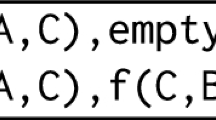Abstract
A brief survey is given of learning theory in a logic framework, concluding with some topics for further research. The idea of learning using logic is traced back to Turing’s 1951 radio address [15]. An early seminal result is that clauses have a least general generalization [18]. Another important concept is inverse resolution [16]. As the most common formalism is logic programs, the area is often referred to as inductive logic programming, with yearly ILP conferences since 1991.
This material is based upon work supported by the National Science Foundation under Grant No. CCF-0431059.
Similar content being viewed by others
References
Alchourrón, C.E., Gärdenfors, P., Makinson, D.: On the logic of theory change: partial meet functions for contraction and revision. J. Symbolic Logic 50, 510–530 (1985)
Arias, M., Khardon, R., Maloberti, J.: Learning Horn expressions with LogAn-H, Tufts University Computer Science Technical Report 2005-4
Cohen, W.W., Page, C.D.: Polynomial learnability and inductive logic programming: methods and results. New Generation Computing 13, 369–409 (1995)
Frazier, M., Pitt, L.: CLASSIC learning. Machine Learning 25, 151–193 (1996)
Getoor, L., Friedman, N., Koller, D., Pfeffer, A.: Learning probabilistic relational models. In: Džeroski, S., Lavrač, N. (eds.) Relational Data Mining, pp. 307–335. Kluwer, Dordrecht (2001)
Goldsmith, J., Sloan, R.H., Szörényi, B., Turán, G.: Theory revision with queries: Horn, read-once and parity formulas. Artificial Intelligence 156, 139–176 (2004)
Grohe, M., Turán, G.: Learnability and definability in trees and similar structures. Theory of Computing Systems 37, 193–220 (2004)
Hegedűs, T.: Generalized teaching dimensions and the query complexity of learning. In: 8th Annual Conference on Computational Learning Theory, pp. 108–117 (1995)
Hellerstein, L., Pillaipakkamnatt, K., Raghavan, V., Wilkins, D.: How many queries are needed? J. of the ACM 43, 840–862 (1996)
Horváth, T., Turán, G.: Learning logic programs with structured background knowledge. Artificial Intelligence 128, 31–97 (2001)
Kelly, K.T., Schulte, O., Hendricks, V.: Reliable belief revision. In: Dalla Chiara, M.L., et al. (eds.) Logic and Scientific Methods. Kluwer, Dordrecht (1997)
Khardon, R.: Learning function-free Horn expressions. Machine Learning 37, 241–275 (1999)
Khardon, R., Roth, D.: Learning to reason. J. of the ACM 44, 697–725 (1997)
Martin, E., Osherson, D.: Scientific discovery based on belief revision. J. of Symbolic Logic 62, 1352–1370 (1997)
Muggleton, S.: Logic and learning: Turing’s legacy. In: Furukawa, K., Michie, D., Muggleton, S. (eds.) Machine Intelligence, vol. 13, pp. 37–56 (1994)
Muggleton, S., Buntine, W.: Machine invention of first-order predicates by inverting resolution. In: 5. International Machine Learning Conference, pp. 339–352 (1988)
Pagnucco, M., Rajaratnam, D.: Inverse resolution as belief change. In: 19. International Joint Conference on Artificial Intelligence, pp. 540–545 (2005)
Plotkin, G.D.: A note on inductive generalization. In: Meltzer, B., Michie, D. (eds.) Machine Intelligence, vol. 5, pp. 153–163 (1970)
Richardson, M., Domingos, P.: Markov logic networks. Machine Learning 62, 107–136 (2006)
Wrobel, S.: Concept Formation and Knowledge Revision. Kluwer, Dordrecht (1994)
Author information
Authors and Affiliations
Editor information
Editors and Affiliations
Rights and permissions
Copyright information
© 2006 Springer-Verlag Berlin Heidelberg
About this paper
Cite this paper
Turán, G. (2006). On Learning and Logic. In: Lugosi, G., Simon, H.U. (eds) Learning Theory. COLT 2006. Lecture Notes in Computer Science(), vol 4005. Springer, Berlin, Heidelberg. https://doi.org/10.1007/11776420_2
Download citation
DOI: https://doi.org/10.1007/11776420_2
Publisher Name: Springer, Berlin, Heidelberg
Print ISBN: 978-3-540-35294-5
Online ISBN: 978-3-540-35296-9
eBook Packages: Computer ScienceComputer Science (R0)



